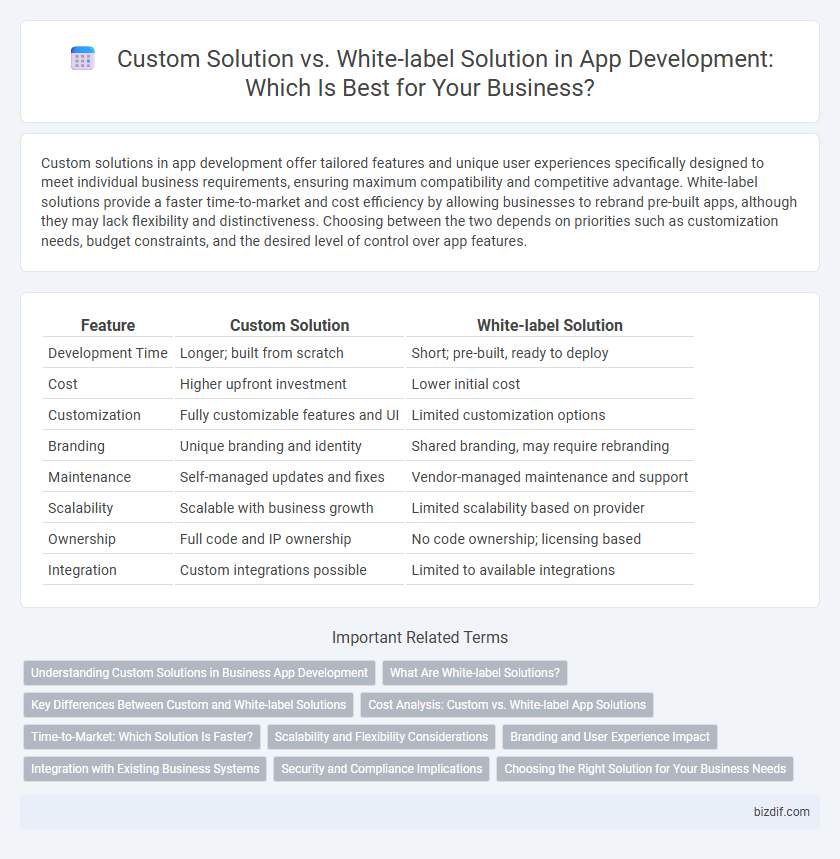Custom solutions in app development offer tailored features and unique user experiences specifically designed to meet individual business requirements, ensuring maximum compatibility and competitive advantage. White-label solutions provide a faster time-to-market and cost efficiency by allowing businesses to rebrand pre-built apps, although they may lack flexibility and distinctiveness. Choosing between the two depends on priorities such as customization needs, budget constraints, and the desired level of control over app features.
Table of Comparison
| Feature | Custom Solution | White-label Solution |
|---|---|---|
| Development Time | Longer; built from scratch | Short; pre-built, ready to deploy |
| Cost | Higher upfront investment | Lower initial cost |
| Customization | Fully customizable features and UI | Limited customization options |
| Branding | Unique branding and identity | Shared branding, may require rebranding |
| Maintenance | Self-managed updates and fixes | Vendor-managed maintenance and support |
| Scalability | Scalable with business growth | Limited scalability based on provider |
| Ownership | Full code and IP ownership | No code ownership; licensing based |
| Integration | Custom integrations possible | Limited to available integrations |
Understanding Custom Solutions in Business App Development
Custom solutions in business app development are tailored specifically to meet unique organizational requirements, offering enhanced flexibility and scalability compared to white-label solutions. These applications integrate seamlessly with existing enterprise systems, allowing for optimized workflows and personalized user experiences that drive operational efficiency. Investing in custom development ensures the app aligns precisely with business goals, providing a competitive advantage through unique features and proprietary functionality.
What Are White-label Solutions?
White-label solutions are pre-built software products developed by one company and rebranded by another to appear as their own app, offering a faster market entry with reduced development costs. These solutions provide standardized features and functionality that cater to broad user needs but limited customization options. Ideal for businesses seeking quick deployment and basic personalization, white-label apps streamline app development without requiring extensive coding expertise.
Key Differences Between Custom and White-label Solutions
Custom app development offers tailored functionality and unique design tailored specifically to business needs, providing full control over features and scalability. White-label solutions provide pre-built, ready-to-deploy apps with limited customization, enabling faster time-to-market and cost efficiency. Key differences include customization level, development time, cost structure, and ownership rights, with custom solutions requiring higher investment but delivering unique user experiences.
Cost Analysis: Custom vs. White-label App Solutions
Custom app solutions often involve higher initial development costs due to tailored features and unique design requirements, whereas white-label solutions offer lower upfront expenses with pre-built functionality that can be rapidly deployed. However, ongoing maintenance and scalability costs for custom apps may be optimized over time, while white-label apps can incur licensing fees and limited customization flexibility. Companies should evaluate total cost of ownership, including development, implementation, licenses, and future scaling, to determine the most cost-efficient approach for their app development needs.
Time-to-Market: Which Solution Is Faster?
Custom app development involves building a tailored solution from scratch, which often requires extensive design, coding, and testing phases, leading to longer time-to-market. White-label solutions offer pre-built, customizable templates that allow businesses to launch quickly by simply branding and configuring existing features. Choosing a white-label solution accelerates deployment and reduces initial development time, making it the faster option for time-sensitive projects.
Scalability and Flexibility Considerations
Custom app development offers unparalleled scalability and flexibility, allowing businesses to tailor features and architecture to evolving user demands and unique workflows. White-label solutions provide a faster deployment but often come with inherent limitations in customization, restricting long-term adaptability to specific market needs. Choosing custom development ensures seamless integration with existing systems and the ability to implement advanced functionalities without constraints, optimizing growth potential.
Branding and User Experience Impact
Custom solutions provide unique branding opportunities by allowing tailored user interfaces that reflect a company's identity, enhancing user engagement and loyalty. White-label solutions offer faster deployment but limit customization, often resulting in generic user experiences that may dilute brand differentiation. Businesses prioritizing distinct brand presence and personalized interactions typically benefit more from custom app development.
Integration with Existing Business Systems
Custom app development offers seamless integration with existing business systems, enabling tailored workflows and compatibility with legacy software such as ERP, CRM, and inventory management platforms. White-label solutions provide faster deployment but often require workaround APIs or middleware to connect with existing infrastructure, potentially limiting functionality and data synchronization. Choosing custom solutions ensures deep integration that supports complex business processes and real-time data exchange essential for operational efficiency.
Security and Compliance Implications
Custom app development offers enhanced security and compliance control by allowing tailored data protection measures aligned with specific industry regulations such as GDPR, HIPAA, or PCI-DSS. White-label solutions often rely on standardized security protocols, which may not meet all regulatory requirements or address unique organizational risks, potentially exposing businesses to compliance gaps. Evaluating the ability to implement and audit security features within each solution type is critical for safeguarding sensitive information and maintaining regulatory adherence.
Choosing the Right Solution for Your Business Needs
Custom app development offers tailored functionality and unique user experiences designed specifically to meet your business requirements, ensuring scalability and competitive advantage. White-label solutions provide cost-effective, ready-made platforms with faster deployment but may lack flexibility and distinct branding opportunities. Evaluating factors like budget, time-to-market, and long-term growth goals is crucial for selecting the ideal approach that aligns with your strategic objectives.
Custom Solution vs White-label Solution Infographic

 bizdif.com
bizdif.com